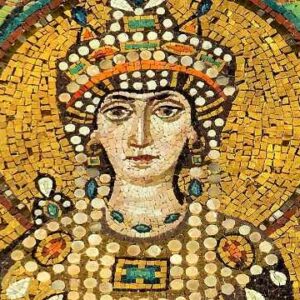Theodora was Justinian I of the Byzantine Empire’s wife. She is regarded as one of the most influential ladies in Byzantine Empire history. She was the emperor’s most dependable advisor. It is alleged that she exploited her power to persuade the king to support social and religious reforms that benefited her. From historical texts like Procopius’ “The Wars of Justinian,” we learn about Theodora’s life. The empress is portrayed in the book as having a powerful and commanding personality. On the other side, the same historian portrays her in “Secret History” as a cunning and cruel queen who used her sexuality to manipulate the emperor. She is described in other records as being highly attractive and religious. Theodora is remembered in history as an empress who championed women’s rights and enacted legislation to outlaw the trafficking of minor girls. The regulations governing divorce were also significantly altered by her. The most significant event that occurred during her tenure was the Nika insurrection, where she displayed her leadership qualities by making an inspirational speech about the dignity of a king. She is thought to have passed away at the age of 48 from cancer.
Early Childhood & Life
On the subject of Theodora’s early years, hardly much is known. According to historians, she was either born around 497 AD on the Greek island of Crete or she was of Syrian descent.
Acacius, her father, trained bears in Constantinople. Her mother was an actress and dancer. Her siblings were two.
She began working at a brothel in Constantinople, following in her sister’s footsteps. She worked as an actor to support herself. Being an actress at the time also required the woman to perform sexual services away from the stage.
She traveled to North Africa with Syrian official Hacebolus when she was 16 years old. She spent a few years in Alexandria, Egypt, after they broke up practicing the non-orthodox religion known as Monophysitism.
In 522, she went back to Constantinople and started working as a spinner of wool. She managed to get Justinian’s attention at this point.
Due to Roman law, which forbade aristocracy from marrying actresses, Justinian was unable to wed her. The rule was overturned by Emperor Justin I in 525, allowing Justinian to wed Theodora. The emperor also welcomed her daughter.
Theodora’s Crown Life
Theodora was a wise and competent empress. In January 532 AD, during the Nika riots, she demonstrated her worth. The rioters demanded that Hypatius, the previous emperor’s nephew, be crowned king. The mob burned down government buildings, putting the emperor in a precarious situation.
When Justinian was unable to control the demonstrators, he made the decision to escape; however, Theodora spoke out against it in a meeting. She spoke out against the notion of going into exile and in support of ruling valiantly till the end.
Justinian was inspired by her outspoken speech and instructed his army to confront the demonstrators, which they were successful in doing. The demonstrators were put to death, and Hypatius was also put to death on Theodora’s orders. According to historians, Justinian praised his wife’s bravery and accepted the truth that it was her tenacity that preserved the Byzantine monarchy.
Theodora’s Achievements
Theodora and Justinian I completely rebuilt Constantinople when the insurrection was put down. Along with the construction of Hagia Sophia, a magnificent example of the inventiveness of Byzantine architecture, several bridges, aqueducts, and churches were also built.
She is most well-known for the changes she brought about for the advancement of women. She enacted anti-prostitution legislation and shut down brothels. She established the Metanoia convent for unemployed sex workers.
She also reinstated the death penalty for rape, expanded women’s rights in divorce and child custody, and repealed the death penalty for adulterous women. She allegedly had an innate affinity for tragic ladies, according to historians.
Theodora Christian Principles
She opposed her husband’s backing of Chalcedonian Christianity and sided with the Monophysite group. She established a monastery on Skype to show her support for the Monophysites.
Leaders of the Monophysite community like Severus and Anthimus were also given shelter by her inside the palace. At her direction, other Monophysite bishops were held in the Hormisdas Palace.
When Severus’ student Aristomachos was banished by Justinian I, Theodora saved him. He was given refuge at the Hormisdas palace by her, and he remained there in safety until her passing.
She even outwitted her husband by persuading the people of Nobatae (in southern Egypt) to convert to Monophysite Christianity. The duke of Thebaid decided that it would be safer to abide by Theodora’s wishes as opposed to those of her understanding husband and postponed the arrival of Chalcedonian missionaries in order to allow the population to become Monophysites.
Personal Legacy & Life
Theodora passed away on June 28, 548, from what is thought to be cancer. She was laid to rest in Constantinople’s Church of the Holy Apostles. She passed away when she was only 48 years old.
One year after her passing, a mosaic of her was made in the Italian basilica of San Vitale in Ravenna.
Estimated Net Worth
One of the wealthiest and most well-known actors is Princess. According to our research, Princess Theodora of Greece and Denmark has a net worth of $5 million, as reported by Forbes, Business Insider, and Wikipedia.
Trivia
The ancient Cyrenaican city of Olbia changed its name to Theodorias in her honor.
Numerous publications, including “The Glittering Horn: Secret Memoirs of the Court of Justinia” and “The Beekeeper’s Daughter,” have been written about her interesting life.
In a video game based on historical civilizations, she plays the Byzantine ruler.


